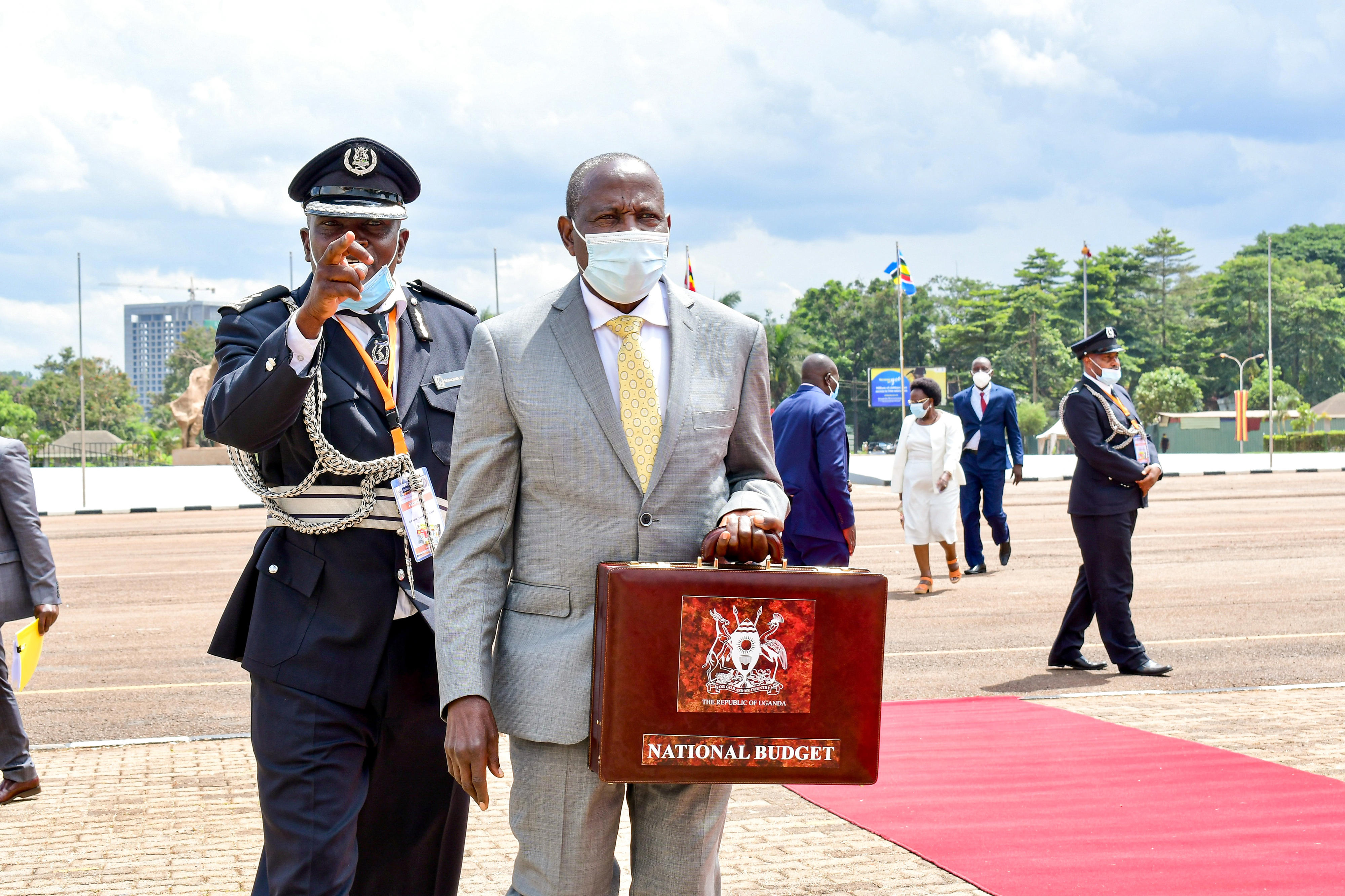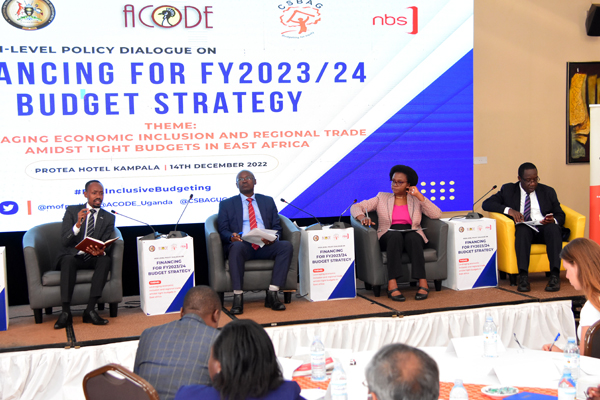Prime
Govt blocks projects with no proof of counterpart funds

A woman crosses a section of the Tororo-Gulu railway line at Layibi in Gulu last year. Rehabilitation of the line stalled after the contractor terminated the contract for works over financing issues. PHOTO/ FILE
What you need to know:
- Authorities say the move is aimed at putting to an end questions why government has been entering into co-financing agreements even when it does not have the capacity to meet the financial obligations that come with such agreements
Government will not be signing any more co-financing agreements with donor agencies and development partners unless they are backed by proof that it will be in position to meet the financial obligations that come with such agreements.
Mr Henry Musasizi, the State Minister for Finance, told this publication last week that the move is aimed at putting to an end questions why government has been entering into co-financing agreements even when it does not have the capacity to meet the financial obligations that come with such agreements.
“We have changed the rules. We need evidence of availability of counterpart funding if a project is to successfully go through all the (planning) stages. That now means government cannot approve a project when we are not sure about the availability of counterpart funding. That is how we have resolved it,” Mr Musasizi said.
Shs139b stalled projects
The decision comes against a backdrop of claims that several projects that are considered crucial to the country’s development and social transformation, some of them contained in campaign manifestos of the ruling National Resistance Movement (NRM) party, have either stalled or are running way behind schedule on account of government’s failure to meet its obligations under several co-financing agreements.
A report of the Auditor General for the financial year ended June 30, 2022, puts the amounts that government has failed to raise as counterpart funding for various projects at Shs139.2b.
The report lists the projects and programmes in sectors, including transport infrastructure, power generation, expansion of the power grid, rural electrification, oil and gas, agriculture and the water and fisheries development as some of which have been affected, which Minister Musasizi blamed on poor planning.
Railways
The first significant project to suffer was the rehabilitation works on the 375km metre-gauge Tororo – Gulu railway line, which was meant to have been undertaken with funding from both the European Union (EU), which was meant to provide €21.5m (Shs84.5b) and Uganda €13.1m (Shs51b).
Whereas work on the project commenced in March 2020, and was expected to have been completed later this year, the contractor, Sogea Satom Construction Company Limited, terminated the contract on June 24, 2022, accusing the government of failing to meet its obligations under the terms of a financing agreement that it had reached with the EU.
“The contractor indicates that by the time of contract termination, the outstanding unpaid amount was totalling to €700,000 (Shs2.7b) in respect to the government portion,” the AG report reads.
The project was cast into jeopardy following a decision by the EU to withhold funding to the tune of €18m (Shs70.5b) out of the €21.5m grant that it had put forward.
“The EU is not in a position to redirect or allocate the remaining funding under the project, taking into account the legal and contractual provisions of the Financing Agreement for the Rehabilitation of the Tororo - Gulu Railway,” Mr Jan Sadek, the EU ambassador to Uganda, told this publication in a recent email.
That means government now has to look for both a new funder and financer for the project, which had been expected to reduce the cost of transport and improve freight services between Uganda and South Sudan and parts of the Democratic Republic of Congo. However, Mr Musasizi expressed optimism that government will find funds to drive the project forward.
“We have a masterplan for all railways lines – Malaba Kampala, Gulu, Kasese, we have a plan. I don’t have facts about the EU (grant), but if the EU does not fund, we shall definitely get another funder,” Mr Musasizi said.
Oil and gas
According to the audit report, government did not contribute any money to the budget of a programme aimed at strengthening the management of the oil and gas sector. The programme received $551,358 (Shs2b), all of which was donor-funded.
“The counterpart funding for the programme from the government amounting to $1.256m (Shs4.6b) was not realised,” the report reads.
Power generation
Perhaps the hardest hit by government’s failure to honour its obligations under the co-financing agreements was the planned development of the 402 Kilowatt Orio Mini Hydro power project in Kabasanja Village in Kabarole District.
However, according to the AG’s report for the period ending June 2022, government availed less than a sixteenth of what was required.
“During the year (ended June 2022), the government provided only Shs500m, out of the allocation of Shs8b for the Orio Mini Hydro Power grant project.
Energy for rural transformation
Under phase III of the energy for rural transformation project, there was a plan to avail credit on concessionary terms, to firms engaged in the selling of solar equipment on pay plan and pay-as-you-go models.
The loans, which were meant to have been accessed through the Uganda Energy Credit Capitalisation Company Limited, were meant to enable eligible households and commercial enterprises acquire solar systems, but only 29 percent of the required funds were remitted, which undermined performance of the solar power project.
“Cumulatively, only Shs32.6b (29.6 percent) of the total budgeted cost of Shs110.06b has been provided by the government of Uganda as counterpart funding,” the report says.
Grid expansion
The Auditor General’s report further called out the Uganda Electricity Transmission Company Limited (UETCL) for poor execution of the grid expansion and reinforcement project (GERP).
The sluggish pace of implementation of the project, which entails expansion of the Kole-Gulu-Nebbi-Arua transmission line, which is being implemented with funding from the World Bank and the government of Uganda, was blamed on, among others, poor disbursement of funds. Government did not remit at least Shs1.84b out of what it had earlier committed to the project.
“Out of the budgeted donor and government of Uganda funds $30,311,916 (Shs112b) and $714,286 (approximately Shs2.6b) only $25,773,250 (Shs95b) and $216, 479 (Shs800m) was received, resulting into a revenue performance of 85 percent and 30 percent respectively.
Irrigation
Also on the list of projects that were affected by either slow disbursement of funds or failure by government to fulfill its obligations was the commercial contract for the design, supply and installation of solar-powered water irrigation systems to the Ministry of Water and Environment under a Sh381b project.
The project was meant to be implemented with funding from the government of Uganda and the Export Credits Guarantee Department of the UK (UKEF). Government was meant to provide counterpart funding of 15 percent of the project cost, which amounted to Shs57.17b, but did not honour its obligation.
“The second tranche for counterpart financing supposed to be disbursed in February was postponed to October 2022 due to resource constraints,” the AG’s report reads.
Agriculture
A vector control project that had been designed to be implemented by the Ministry of Agriculture, Animal Industry and Fisheries also suffered shortfalls in counterpart funding. That suffered a funding shortfall of only Shs1.6b.
Poverty alleviation
Some of the activities that had been planned for implementation under the project for financial inclusion in rural areas (PROFIRA), were not implemented as government remitted Shs3.28b out of the Shs3.67b it was meant to provide as counterpart funding.
Fisheries
The planned construction of a surveillance station, three landing sites, and supply of a research vessel under the Multinational Lakes Edward and Albert Integrated Fisheries and Water Resources Management Project (LEAF) II also suffered reversals due to failure by government to meet its obligations under a co-financing agreement that it had entered into.
“Out of the approved budgeted revenue of $333,824 (Shs1.2b), $320,930 (Shs1.1b) was realised, representing performance of 96 percent of the target,” the AG’s report reads.
Sanitation
Implementation of the City Wide Integrated Sanitation (CWIS) programme, a continuation of the Kampala faecal sludge management and improvement of faecal sludge management for onsite sanitation in Kampala City, which was being implemented by Kampala City Council Authority (KCCA), also suffered reversals.
Whereas donors, who included the Bill and Melinda Gates Foundation, provided funding to the tune of $4,430,827 (Shs16b) over a four-year period, government did not provide the $200,000 (approximately Shs739m).
The cost
Whereas it was not possible to establish the extent of the damage that has been caused by government’s failure to raise money to see the projects through, some of the damage can already be seen in the penalties that government is now bound to pay for failure to meet its obligations.
According to the Auditor General, government will, for example, be paying Sogea Satom €3,933,775 (Shs15b) as penalties for failure to honour its obligations.
However, the shadow minister of finance and economic planning, Mr Muhammad Muwanga Kivumbi, insists that government’s failure to meet its obligations is costing the country by increasing its debt burden, especially in cases where projects are being implemented using borrowed money.
“They do not say that you do not pay interest on the loans because you have not yet got your share for co-financing the project or because you are yet to secure the site. You begin to pay amortisation and interest immediately,” Mr Muwanga Kivumbi says.




